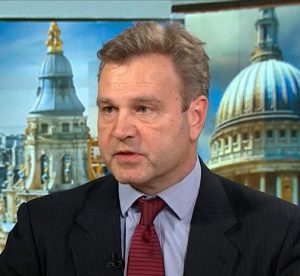“You’ve got to get this done.†Hardly the words of encouragement UK pension fund managers wanted from the governor of the Bank of England. Speaking in Washington late on Tuesday, Andrew Bailey insisted they wind up excess leverage in gilts before the BOE ends its support for the country’s government bond market.
That means the pension funds have just three days. The central bank confirmed early on Wednesday that its temporary bond-buying £65 billion ($72 billion) safety net will be whisked away on Friday. It’s a surprisingly aggressive stance from a central bank that has thus far done a stand-up job maintaining financial stability. Optimists among the fund managers may be hoping that the BOE will keep the balance of the facility in reserve if market conditions require further support. But, for now, expect a larger uptake through Friday because they have little option but to take Bailey at his word.
There is potentially more bad news for people expecting the BOE to postpone quantitative tightening. There is no respite from new supply, either from the government or the unwind of the central bank’s holdings of quantitative-easing bonds. The UK Treasury’s Debt Management Office sold £3.5 billion of a new five-year gilt , after sale of a 30-year index-linked gilt.
The DMO is going ahead with its sale of a new 2038 maturity bond, though that’s been delayed till the week of November 7. While that gets it out of the way of the BOE’s active gilt sales — which start from October 31 — the markets are apprehensive about an increased unwind of QE taking place at all. Such sales would double the amount of QT, just as interest rates are being hiked aggressively, too. In regular times, an extra £10 billion of gilts over a quarter across the yield curve could be easily absorbed. But these aren’t ordinary times.
To be fair, the BOE has become more accommodating in its buyback operations rather than keeping them at backstop levels. (The central bank has been requiring identification codes to verify the institutions it is ultimately buying back from.) On Tuesday, it purchased £3.3 billion in conventional and inflation index-linked bonds (the latter form the largest part of pension fund holdings). It’s the highest amount yet on record and brings the total buyback to nearly £9 billion. This may more than double by the end of the week if the BOE quibbles less about the price it pays.
The overall situation, however, isn’t helped by the UK economy. Even before the gilt crisis, it appeared to be slipping into recession. Bloomberg Economics estimates the market turmoil since late September will take at least another 1% off gross domestic product. August GDP data, released on Wednesday, showed the economy fell 0.3%, worse than expectations, driven by a 1.8% fall in industrial production. Services were also surprisingly weaker at minus 0.1%. The September figure is expected to fall by 1%, in part due to the extra holiday from Queen Elizabeth’s funeral. The result will likely mean third-quarter growth fell 0.7%.
The question is whether a weaker GDP alters the monetary policy committee’s outlook at its next economic review on November 3. Much of that depends on how Chancellor of the Exchequer Kwasi Kwarteng’s fiscal statement on Oct. 31 is received. From his statements in the House of Commons , a relentless pursuit of growth remains top of the agenda. That will be of concern to an inflation-fighting central bank: Annual price gains are already around 10%. Still, recent events mean the BOE must carefully consider the risks of too big an interest-rate hike.
Uncertainty is a very poor backdrop in which to make investment decisions, especially for foreign investors even if sterling is on its knees. The UK’s weak economy would normally be an attractive environment to hold bonds, particularly long maturities. This, perhaps, explains some of the reluctance for pension funds to dispose of gilts at low prices. It’s the type of asset they are genetically predisposed to own. There certainly has been a long lag time — nearly three weeks now — for sizable disposals of long-dated gilts. There’s an extra cog in the chain for many pension funds, having pooled their gilt investments with third-party liability-driven investment managers handling the leveraged risk. There is, however, no time to dally now.
—Bloomberg
Marcus Ashworth is a Bloomberg Opinion columnist covering European markets. Previously, he was chief markets strategist for Haitong Securities in London
 The Gulf Time Newspaper One of the finest business newspapers in the UAE brought to you by our professional writers and editors.
The Gulf Time Newspaper One of the finest business newspapers in the UAE brought to you by our professional writers and editors.

